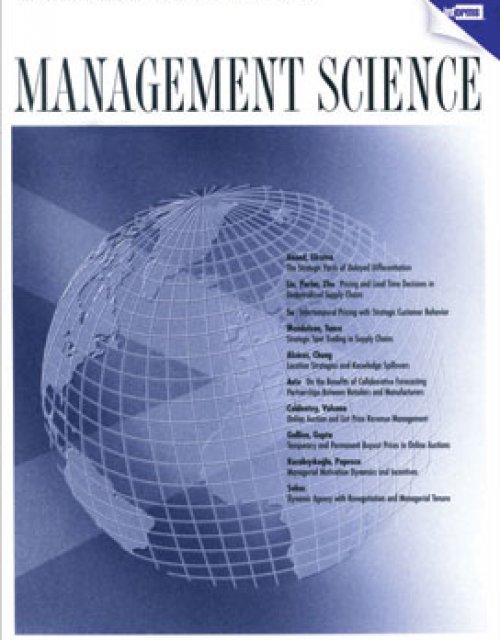Publication records
Subject(s)
Human resources management/organizational behavior
Journal Pages
86–90
Subject(s)
Human resources management/organizational behavior
Keyword(s)
Marketing, personal branding, branding
In this note you will find a summary and an overview of the principles of branding, as well as an illustration of application of these principles to build personal brands. We will review the principles of branding, apply these concepts, and generate a tangible and useful outcome – your personal brand plan.
| buy now | buy now | buy now |
Subject(s)
Information technology and systems; Strategy and general management
Journal Pages
50–53
Subject(s)
Product and operations management
Keyword(s)
Revenue management, pricing, coordination, price-sensitive stochastic demand, hierarchical policies, lost sales rate elasticity
The integration of systems for pricing and revenue management must trade off potential revenue gains against significant practical and technical challenges. This dilemma motivates us to investigate the value of coordinating decisions on prices and capacity allocation in a stylized setting. We propose two pairs of sequential policies for making static decisions—on pricing and revenue management—that differ in their degree of integration (hierarchical versus coordinated) and their pricing inputs (deterministic versus stochastic). For a large class of stochastic, price-dependent demand models, we prove that these four heuristics admit tractable solutions satisfying intuitive sensitivity properties. We further evaluate numerically the performance of these policies relative to a fully coordinated model, which is generally intractable. We find it interesting that near-optimal performance is usually achieved by a simple hierarchical policy which sets prices first, based on a non-nested stochastic model, and then uses these prices to optimize nested capacity allocation. This tractable policy largely outperforms its counterpart based on a deterministic pricing model. Jointly optimizing price and allocation decisions for the high-end segment improves performance, but the largest revenue benefits stem from adjusting prices to account for demand risk.
© 2014 INFORMS
Volume
60
Journal Pages
730–752
ISSN (Online)
1526-5501
ISSN (Print)
0025–1909
Subject(s)
Human resources management/organizational behavior
Keyword(s)
Organizational behavior, psychology, error management, safety
Volume
1
Journal Pages
23–43
Subject(s)
Economics, politics and business environment
Keyword(s)
Advance selling, bundling, price discrimination
JEL Code(s)
L11, D42
We show that a monopolist's problem of optimal advance selling strategy can be mathematically transformed into a problem of optimal bundling strategy if four conditions hold: i. consumers and the firm agree on the probability of the states occurring, ii. the firm pre-commits to the spot prices to be charged in the advance selling stage, iii. consumers are risk-neutral, and iv. consumers and the firm do not have time preferences or when they do have time preferences, they discount future at the same rate. The result allows both researchers and practitioners to apply the insights from the well-developed vast literature on bundling to advance selling problems. In particular, we show that advance selling is more profitable than spot selling when consumer valuations across the states are independent or negatively dependent or positively dependent up to a point. We furthermore illustrate the effect of advance selling on the spot prices and consumer welfare: When the firm offers advance selling discounts, it sets higher spot prices, so consumers who do not buy in advance are worse off due to the firm offering advance selling discounts. We extend our analysis to the cases of more than two states and competition only in one of the states. We also show how advance selling can be used as an entry deterrence strategy.
© 2014 INFORMS
Volume
33
Journal Pages
259–272
Subject(s)
Marketing
Keyword(s)
Participative pricing, pay what you want, long-term price dynamics, reference prices, latent growth modeling
Volume
25
Journal Pages
25–36
Subject(s)
Ethics and social responsibility
Keyword(s)
Business ethics, corporate responsibility, social responsibility, international ethics, crisis management, stakeholders, politics
On Thursday January 27, 2011, hundreds of thousands of protesters in Egypt were vociferously demanding an end to the 30-year rule of President Hosni Mubarak, and to the state of emergency he had let prevail, and nurtured during that tenure. The protest movement was expected to gather even greater momentum following the afternoon prayers the next day, a Friday. The communication and connectivity through social media had acted as a key catalyst in enabling the protesters to coordinate their actions. President Mubarak’s government decided to strike hard at the lifeline of this virtual medium, by exploiting some of the rights that the state of emergency had accorded them. That afternoon, the government ordered the three main voice and data communications providers in Egypt – Vodafone, Mobinil, and Etisalat – to suspend services in selected areas. Among these areas was Tahrir Square (“Freedom/Martyrs’ Square”) in Cairo, the biggest nucleus where protesters had assembled. Later, the government would also instruct these communications providers to broadcast propaganda text messages to all their subscribers, imploring them to be on the side of the Egyptian Army, which the government said was the true protector of Egypt. When Hatem Dowidar, CEO of Vodafone Egypt, heard about the government’s order, he was about to take a crucial decision. He knew that the situation in Egypt was being observed closely from all over the world. Dowidar also realized that the course of action he opted for would have consequences not just for Vodafone Egypt, but also for the parent Vodafone Group. He contemplated the possible consequences, well aware that any decision he took would invariably evoke strong reactions.
The case offers the opportunity to discuss some implications of national crises on multi-national corporations (MNCs), especially implications for business, society, and ethics. Given the fairly well-known historical context of the case, as well as, the non-technical nature of the underlying issue, the case can be used for a broad range of audiences. We have already successfully used the case in MBA settings, in executive education courses, and in workshops that were open to the general public.
| buy now | buy now | buy now |
Subject(s)
Ethics and social responsibility
Keyword(s)
Business ethics, corporate responsibility, social responsibility, international ethics, crisis management, stakeholders, politics
On Thursday January 27, 2011, hundreds of thousands of protesters in Egypt were vociferously demanding an end to the 30-year rule of President Hosni Mubarak, and to the state of emergency he had let prevail, and nurtured during that tenure. The protest movement was expected to gather even greater momentum following the afternoon prayers the next day, a Friday. The communication and connectivity through social media had acted as a key catalyst in enabling the protesters to coordinate their actions. President Mubarak’s government decided to strike hard at the lifeline of this virtual medium, by exploiting some of the rights that the state of emergency had accorded them. That afternoon, the government ordered the three main voice and data communications providers in Egypt – Vodafone, Mobinil, and Etisalat – to suspend services in selected areas. Among these areas was Tahrir Square (“Freedom/Martyrs’ Square”) in Cairo, the biggest nucleus where protesters had assembled. Later, the government would also instruct these communications providers to broadcast propaganda text messages to all their subscribers, imploring them to be on the side of the Egyptian Army, which the government said was the true protector of Egypt. When Hatem Dowidar, CEO of Vodafone Egypt, heard about the government’s order, he was about to take a crucial decision. He knew that the situation in Egypt was being observed closely from all over the world. Dowidar also realized that the course of action he opted for would have consequences not just for Vodafone Egypt, but also for the parent Vodafone Group. He contemplated the possible consequences, well aware that any decision he took would invariably evoke strong reactions.
The case offers the opportunity to discuss some implications of national crises on multi-national corporations (MNCs), especially implications for business, society, and ethics. Given the fairly well-known historical context of the case, as well as, the non-technical nature of the underlying issue, the case can be used for a broad range of audiences. We have already successfully used the case in MBA settings, in executive education courses, and in workshops that were open to the general public.
| buy now | buy now | buy now |

